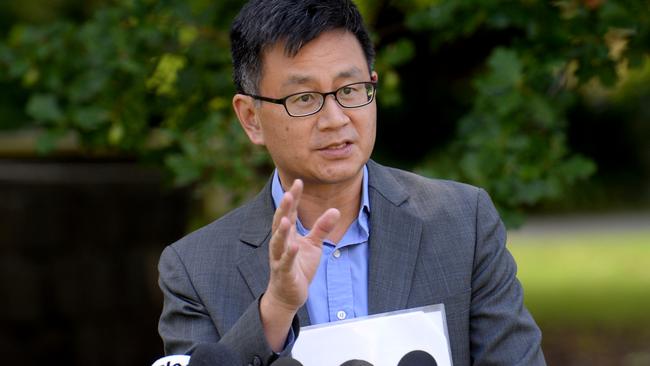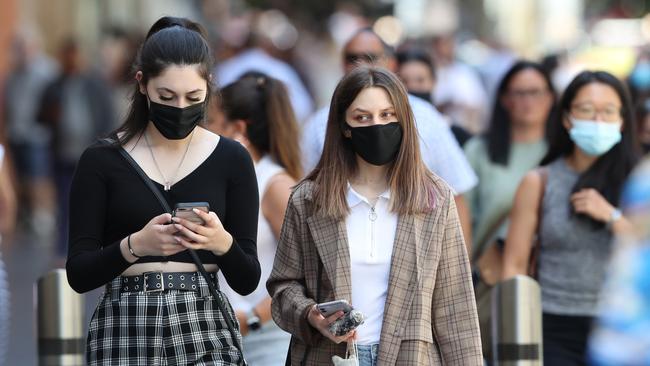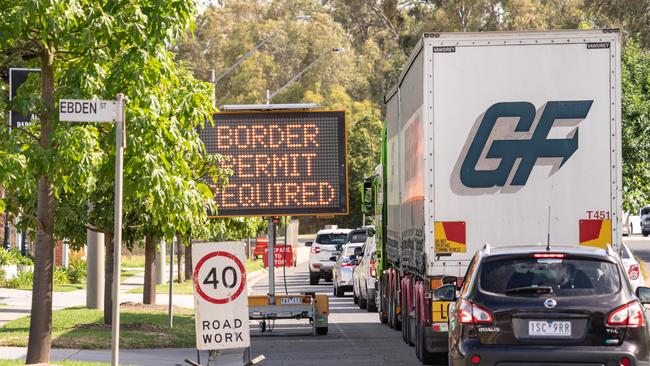Rolling coverage: Deputy CHO backs AstraZeneca vaccine, Victoria marks one week without community transmission
Updated health advice means some travellers from Brisbane who are now in Victoria must isolate immediately.
Coronavirus
Don't miss out on the headlines from Coronavirus. Followed categories will be added to My News.
This coronavirus article is unlocked and free to read in the interest of community health and safety.
- Tap here for full digital access to trusted news from the Herald Sun and Leader for just $5 a month for the first three months.
Travellers who completed 14 days of hotel quarantine at the Grand Chancellor hotel in Brisbane on or after December 30 and who are now in Victoria have been urged to isolate.
Victoria’s Health Department urged anyone affected to immediately call the coronavirus hotline.
The local government areas of Greater Brisbane, Moreton Bay, Redlands, Logan, Ipswich will remain in the red zone and travel to Victoria is not permitted without an exemption, exception or permitted worker permit.
Anyone who has arrived into Victoria from December 30 must get tested and quarantine at home until they receive a negative result. They should call the coronavirus hotline on 1800 675 398 immediately.
The previous advice issued by the DHHS had been for travellers to get tested if they had been in these Queensland areas on or after January 2 but the public health advice was updated based on a cluster in the hotel quarantine program.
DEPUTY CHO BACKS OXFORD JAB
Victoria’s deputy chief health officer has backed the Oxford-AstraZeneca vaccine, despite claims that it would not help Australia achieve herd immunity.
Medics and infectious disease experts are calling for Australia to invest in more high-efficacy vaccines, rather than relying on the AstraZeneca jab.
Australia has ordered 53.8 million doses of the AstraZeneca vaccine, which has been shown in trials to have a much lower level of efficacy than Pfizer and Moderna vaccines being injected in Britain, France, Israel and the US.
But epidemiologist Professor Allen Cheng on Wednesday backed the AstraZeneca jab, saying vaccines protected people both directly and indirectly.
“I’d argue that we should use all available vaccines that prevent COVID, even if they don’t reduce transmission as much as we’d like … if enough people get vaccinated, then even if you don’t (or can’t) get vaccinated, you have a reduced risk of getting infected,” he said.

“This is because you aren’t likely to get infected if everyone around you doesn’t have infection.
“This is known as “herd immunity”. The proportion of people that need to be immune to achieve herd immunity depends on the infectiousness of the disease.”
Epidemiologist Prof Cheng is also co-chair of the Australian Technical Advisory Group on Immunisation, which is the panel charged with giving the federal government expert advice on vaccinations.
He said it was unknown if COVID-19 vaccines could give Australia herd immunity and likened them to the annual influenza vaccine.
“The (AstraZeneca) vaccine does reduce infectiousness so some degree. But even if all adults were vaccinated, it probably wouldn’t achieve herd immunity … So, these vaccines prevent disease, and some may reduce infectiousness to an uncertain and varying degree.
“This is not unlike the flu vaccine — it reduces infection by about 50% but we don’t get herd immunity.
“But there is still benefit in getting a vaccine that protects you, even if it may not block transmission. Getting the vaccine means that you have a reduced risk of getting sick.”
The epidemiologist also compared the advantages and disadvantages of the available vaccines and said Australia had to choose between a more effective vaccine or a more timely rollout.
“The Pfizer vaccine looks about as good as it gets — it appears to reduce symptomatic infection by about 95%, even if we don’t know yet whether it reduces asymptomatic infection,” he wrote.
“But if we only used this vaccine, we could only vaccinate 5 million people (~20% of the population) over the next year. This wouldn’t achieve herd immunity even if it completely prevented infection and infectiousness (which we don’t know yet).
“The (AstraZeneca) vaccine may not be as good (it reduces infection by about 62-70%) but this can be rolled out more quickly. Even if doesn’t protect against transmission, it does protect against disease and that’s a benefit.
“The choice we have isn’t whether to use one vaccine or the other. Our choice is whether to offer everything we have now to protect as many people as we can, or to leave some effective vaccines in the warehouse.”
Prof Cheng also highlighted that other nations were in higher need of the vaccine, with the US averaging more than 3000 COVID-19 deaths per day for the past week.
It has also reported more than 200,000 new infections for seven straight days.
“If you were in charge of a vaccine manufacturer, would you send your supply to a country where there are thousands of deaths a day or to Australia,” Prof Cheng asked.
ONE WEEK WITHOUT A LOCAL CASE
Victoria on Wednesday marked one week without community transmission after the Black Rock cluster that sparked alarm early in the new year.
No new local cases of coronavirus were recorded overnight, but three have emerged in hotel quarantine.
Nearly 18,000 tests were received on Tuesday, and 35 active cases remain across the state.
In Queensland, six cases of the highly infectious UK strain of COVID-19 have now been linked to a Brisbane hotel quarantine facility, prompting authorities to take extraordinary measures to keep any further outbreak under control.
While Queensland recorded no new cases of locally acquired COVID-19 on Wednesday, Premier Annastacia Palaszczuk confirmed the Hotel Grand Chancellor was now considered a cluster.

It comes after a hotel quarantine worker contracted the virus and infected her partner, as confirmed on Tuesday.
The strain had already been detected in a traveller who had returned from the UK on December 30, and then in his partner. The cases have since been genomically linked to two people who tested positive in the hotel on Tuesday after returning from Lebanon.
Ms Palaszczuk said as a precaution, the remaining 129 guests were being moved to other hotels.
Meanwhile, NSW has recorded one new case of COVID-19 to 8pm Tuesday, a child linked to the Berala cluster.
PERMIT SYSTEM UNDER FIRE
The state government is under pressure to reclassify parts of its new travel permit system amid confusion and frustration in border communities.
More than 54,000 permits were issued by Tuesday afternoon after the new system failed to launch on time on Monday night. But frustration continued for residents near both the NSW and South Australian borders, who said the system was an overreach.
Under a border bubble arrangement with NSW, Victorians from as far south as Bendigo can freely cross the border and travel as far as Wagga Wagga.
But any Victorians outside the bubble can’t cross the border without having to take a COVID-19 test and isolate until they get a negative result.
Kylie, who didn’t want to give her surname, said her NSW-based parents could visit her in Victoria with no checks, but she was forced to isolate after visiting them.
“I fully support the bubble, but it doesn’t make sense,” she said.
“All of the NSW border bubble can travel freely throughout Victoria, as long as it is necessary, and I can’t.”
All the staff and students who live in South Australia but attend the primary school in Apsley in Victoria would be forced to apply for a permit daily.
Opposition Leader Michael O’Brien wants the green zone permits scrapped.
“That seems to be just a massive bureaucratic overreach. It doesn’t keep anyone safe. It simply makes it difficult for Victorians to come home and come home safely,” he said.
A declaration that people hadn’t been to a red zone in the previous 14 days confused Victorians returning from regional NSW, which moved from a hots pot to an orange classification at 6pm on Monday.
A government spokesman confirmed the new classification and said people in newly orange zones could apply for a permit.

Matt Curry crossed the Echuca-Moama border from his home in Albury with his family where cars entered Victoria via a single lane.
He said: “It’s a lot of effort for not many cases. You just have to grin and bear it.”
Liberty Victoria President Julia Kretzenbacher said it was concerning that Victorians were prevented from returning home.
“We understand that there need to be proactive steps taken to limit the spread of COVID-19 and the introduction of a permit system can make things a bit clearer for people,” she said.
“However, we are concerned that the current system seems to exclude Victorians in the red zone from returning home, with uncertainty about when exemptions would be granted.
“Liberty Victoria is concerned about the indefinite exclusion of Victorians stuck in red zones, with no option of home quarantine for those Victorians if they wish to come home.
“Any restrictions on the travel of Victorians have to be proportionate with human rights, including freedom of movement, and the government needs to explain why home quarantine is not an option for Victorians in the red zone who wish to return home.”
MUSIC SCENE GIVEN $8M BOOST
Melbourne’s iconic live music scene will receive an $8 million cash injection to help it recover from the coronavirus pandemic.
Musicians, venues and associated production workers have been hit hard by the pandemic with gigs forced to grind to halt.
Now a new industry recovery package is set to help more than 130 Victorian live music businesses.
Minister for Creative Industries Danny Pearson announced the funding on Wednesday.
“Our music industry creates and supports thousands of jobs – injecting millions into our economy,” he said.
“The programs will revive our music culture by supporting local businesses and workers, so they can continue to do what they do best.”
Music businesses, artists and venues will share in grants totalling around $3 million which Mr Pearson said would support nearly 5000 jobs.
Another $5 million would be shared among 68 music venues as part of the final tranche of the Victorian Live Music Venues Program.
The grants would support businesses and venues to make events COVIDSafe, deliver statewide tours, business development opportunities and digital initiatives right across Victoria.
Iconic Melbourne venues Cherry Bar, Revolver Upstairs and Section 8 are among those to benefit.
Regionally, Geelong’s Barwon Club Hotel, Hepburn’s Palais, Torquay Hotel, the Guilford Hotel and Bendigo’s Golden Vine Hotel would also be included.




